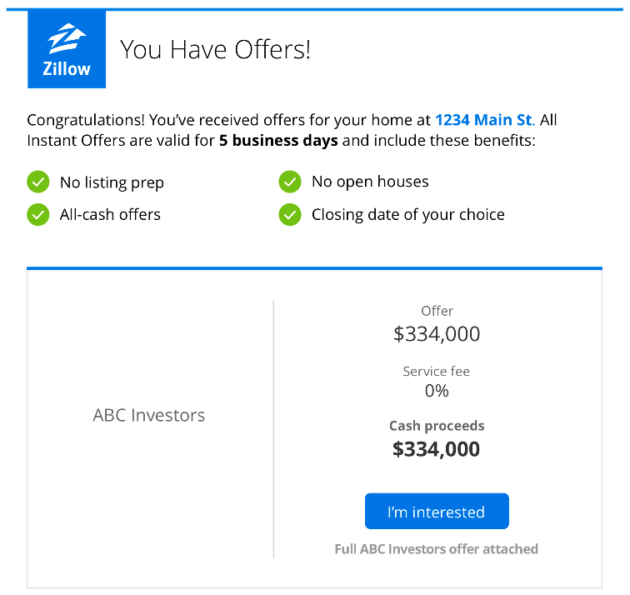It’s been about a month since Zillow Instant Offers launched in Orlando and Las Vegas, and – despite industry doomsayers – the framework of real estate transactions remains intact. So far, there’s no verifiable or indisputable evidence that this new system of real estate buying and selling has taken a dollar of commissions from any real estate professional.
The reason for this is simple: the knee-jerk reactions by the National Association of REALTORS® and their membership were based on scare-mongering because the ‘Instant Offers’ model MIGHT possibly one day cost an NAR member a commission.
While this level of reaction to a potential threat to their memberships’ (and the organization itself, by extension) livelihood is not surprising given the scope of the Zillow Instant Offers model, it’s based on a number of logical fallacies: most notably the straw man, oversimplification, ad hominem – and, most prominently, the red herring.
To address the overall NAR argument, let’s break it down fallacy-by-fallacy, shall we?
The Straw Man
“As a REALTOR®, I follow a Code of Ethics that includes a pledge to “protect and promote the interests of [my] client” (Article 1). These online companies may facilitate your transaction, but not necessarily with your interests in mind. With “Instant Offers,” unless you choose to work with an agent, you’ll be on your own handling the details of the transaction.”
First, let’s be clear on something: the concept of ‘best interest’ isn’t proprietary to designated REALTORS® any more than it is to any other trade/industry group. A professional is not a professional by designation so much as they are by reputation. In this instance, the lack of a professional designation on the part of Zillow can’t – and shouldn’t be – construed as a lack of legitimacy or trustworthiness.
There was a time when NAR members weren’t yet established as knowledgeable professionals; by virtue of the legitimization process they themselves underwent to establish the profession, so too should Zillow’s ‘Instant Offers’ platform be allowed the opportunity to grow and perform before being judged.
Until the platform has been given ample opportunity to demonstrate value (or lack thereof) to , all assumptions regarding outcomes for interested parties (REALTORS®) can – and should – only be interpreted as premature and more reflective of the fears of the NAR as a collective than of any ‘threat’ (real or perceived) Zillow Instant Offers will pose to the best interests of buyers.
Until the platform has been given ample opportunity to demonstrate value (or lack thereof), all assumptions regarding outcomes for interested parties can – and should – only be interpreted as premature and more reflective of the fears of the NAR as a collective than of any ‘threat’ (real or perceived) ‘Instant Offers’ will pose to buyers.

Ad Hominem
Following the previous point, it should be noted that not only is the straw man argument being publicly positioned by the NAR, but the context is as a talking point for NAR members to dissuade sellers from listing with Zillow Instant Offers. They’re ACTIVELY disparaging Zillow with this talking point, and that is just plain unattractive.
But then they double down on the attacks.
“As a publicly traded company that has yet to show a profit, Zillow will always be experimenting with ways to generate revenue as it must placate its shareholders” – Inman, June 5, 2017
If that isn’t the exact reasons anti-trust laws are in place, then I’m not sure what is. In my opinion, this is a terrible look for the NAR, and to so blatantly and unflinchingly attack a competitor; especially one who is ultimately not really a competitor at all – at least not in the way many agents seem to believe.
Oversimplification
The attack by the NAR, as mentioned in the first point, is extremely premature, and is based on a false notion/assumption. The reality of the Zillow Instant Offers model is that it is a preliminary step which intends to pair motivated sellers with larger institutional investor buyers prior to the seller listing with an agent. NAR members only ever stand to lose out on ‘unicorn’ commissions where the seller simply doesn’t care how much they get for their property.
For such a motivated seller, conceivably the buyer agent could delay a quick sale in an effort to secure a more favorable offer and therefore higher commission, while the seller simply wants to cash out as quickly as possible.
In that instance, said seller would likely forego an agent to avoid paying a commission – if their interest were purely a speedy transaction with no regard for opportunity cost. This leads perfectly into my next – and final – point.
The Red Herring
Simply put, the entire objection is empty posturing intended to make its members feel they are being represented – and some members called it as such.
“They provide useless affirmative advertising and beneficial lobbying for laws, that’s it. Their slow reactions and illusion of security is their demise.”, read a comment from the blog post. Another blamed the NAR itself for the position Zillow had put NAR membership in. ““Seriously, the[y] make over $200 million a year, and they’re literally watching Zillow take over the real estate industry.” – Inman, June 6, 2017
And this is a fair comment; this isn’t the first time the NAR has shown to be ill-prepared for a changing marketplace – or wrong in its reaction. The Department of Justice sued the NAR in 2005 – a case in which the NAR was forced to settle in 2008 – after complaints about frustrating efforts of emerging companies wishing to digitize property listings by way of boycotts, non-compete agreements and “other restraint of trade”. The NAR has clearly learned from past mistakes, ignoring petitions from members requesting intervention.
The irony is that it’s the scare-mongering and attacks the NAR is using to react to ‘Instant Offers’ which seem to be stoking the fears of the very membership accusing them of failing to react adequately to the emergence of Zillow’s ‘Instant Offers’ platform.
Why Zillow Instant Offers Is Not A Threat To NAR Members
The reality is that – in theory – there will be a minimal threat to NAR’s bottom line because the ‘quick and easy’ seller targeted by the ‘Zillow Instant Offers’ platform directly contradicts the seller persona outlined in all six of the talking points the NAR in response to the platform.
- Knowledge of the community doesn’t matter to someone looking to cash out quickly.
- Someone interested in selling ‘as is’ has no interest in anyone’s help ‘getting the house ready for sale’.
- A ‘wider audience’ is meaningless when compared to a speedy transaction with a liquid buyer to a motivated seller.
- If someone is ready and willing to take an investor offer for quick sale, the higher price an agent can negotiate is realistically only of benefit to said agent, as the net proceeds would only increase slightly for the seller when factoring in the commission.
- A seller motivated enough to sell to an investor in a quick sale realistically doesn’t care who buys it, or how much they love it.
- The implication that a direct investor sale isn’t “promoting the best interests” of a seller, as mentioned, is a logical fallacy. The persona of a potential ‘Zillow Instant Offers’ seller actually makes it so that a real estate agent realistically wouldn’t be promoting the best interest of a client interested in a quick sale; at least not in the same way, they would be in representing a seller more interested in getting every single penny from an offer. The assumption that a seller accepting an offer via the ‘Instant Offers’ platform is ‘leaving money on the table’when actually the majority of said money left on the table would be going into an agent’s commission anyhow.
Conclusion
The Zillow Instant Offers platform identifies a very real segment of the market which represented a ‘sweet spot’ for agents previously – sellers who didn’t care how much they got for their property, and that represented not only easy commissions for designated NAR members lucky enough to pull one of these ‘unicorn’ sellers, but means by which they could boost their commission on the transaction by securing a higher offer for the listing.
That is the beginning, middle, and end of the objection of NAR members demanding more action from their national body, the NAR – even going so far as expecting the same reactions which resulted in the NAR being sued by the Department of Justice in 2005:
“The reality of Zillow’s ‘Instant Offers’ platform is that it is seeking a seller persona which doesn’t stand to benefit as profoundly from the service of a REALTOR® as much as a REALTOR® would stand to benefit from gaining said listing. Motivated sellers who would be likely to participate in the ‘Instant Offers’ program want quick and easy – and Zillow can offer them that in a way a REALTOR® simply cannot. This doesn’t negate the fact that Zillow still requires cooperation with REALTORS® to make its business model work.
Zillow Chief Business Officer Greg Schwartz called out the company’s deep financial ties to the industry. “Seventy percent of our revenue is from working with more than 80,000 agents, teams and brokers who advertise with Zillow Group,” he wrote. “We believe in agents, and we always encourage consumers to work with them.”
He went on to add “Early results show that the program is generating significant consumer interest, according to Zillow. One agent had received more than 100 leads through Zillow Instant Offers and has converted at least two of them into listings, according to Zillow Group.” – Inman, June 7, 2017
With that in mind, the rationale for assuming that Zillow Instant Offers is trying to ‘elbow out’ NAR members from the buying process is preposterous. If anything, it is streamlining the selling process so that sellers not wanting a long and drawn out selling process, and who are interested enough in a quick sale that a NAR member might be more of a hindrance than a help, are serviced by pairing them up with investors interested in a quick, clean transaction.
That’s just the way the winds of change are blowing, and it’s not a threat to anyone or anything; it’s a move to better service a market segment. Such is the nature of innovation in business.






